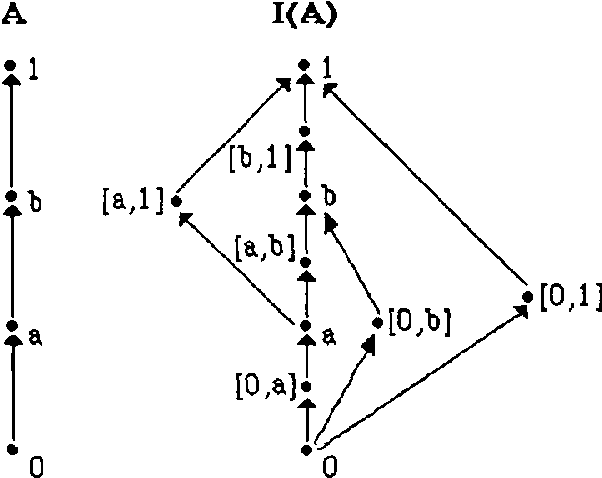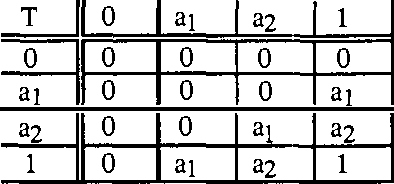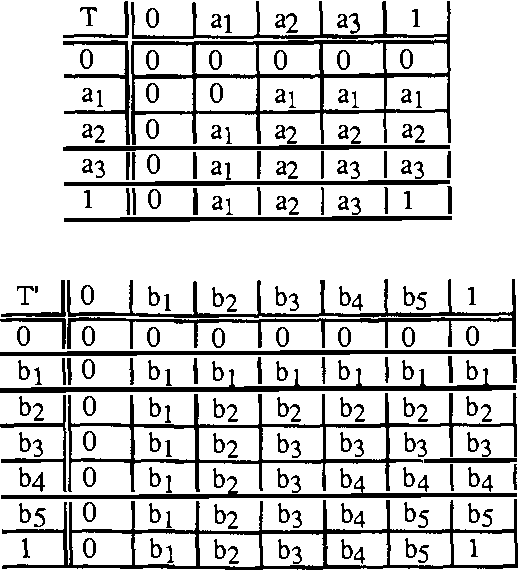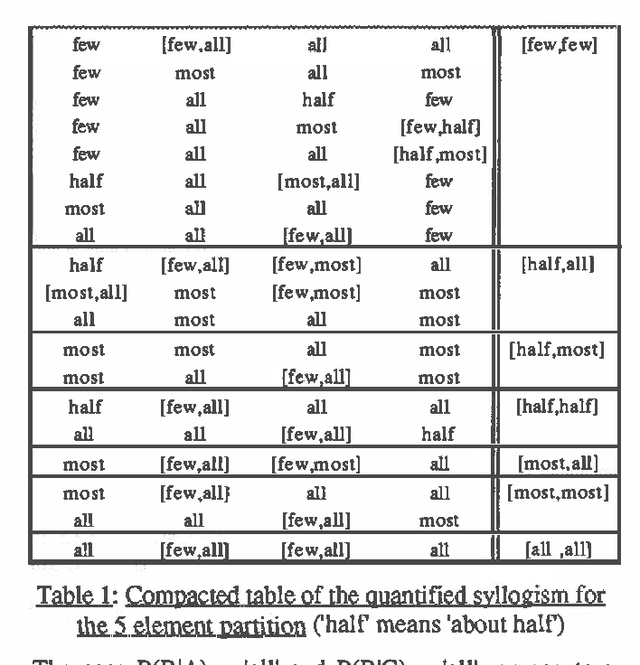Lluis Godo
On Lockean beliefs that are deductively closed and minimal change
Jul 08, 2025Abstract:Within the formal setting of the Lockean thesis, an agent belief set is defined in terms of degrees of confidence and these are described in probabilistic terms. This approach is of established interest, notwithstanding some limitations that make its use troublesome in some contexts, like, for instance, in belief change theory. Precisely, Lockean belief sets are not generally closed under (classical) logical deduction. The aim of the present paper is twofold: on one side we provide two characterizations of those belief sets that are closed under classical logic deduction, and on the other we propose an approach to probabilistic update that allows us for a minimal revision of those beliefs, i.e., a revision obtained by making the fewest possible changes to the existing belief set while still accommodating the new information. In particular, we show how we can deductively close a belief set via a minimal revision.
Rotations of Gödel algebras with modal operators
May 23, 2024Abstract:The present paper is devoted to study the effect of connected and disconnected rotations of G\"odel algebras with operators grounded on directly indecomposable structures. The structures resulting from this construction we will present are nilpotent minimum (with or without negation fixpoint, depending on whether the rotation is connected or disconnected) with special modal operators defined on a directly indecomposable algebra. In this paper we will present a (quasi-)equational definition of these latter structures. Our main results show that directly indecomposable nilpotent minimum algebras (with or without negation fixpoint) with modal operators are fully characterized as connected and disconnected rotations of directly indecomposable G\"odel algebras endowed with modal operators.
An elementary belief function logic
Mar 23, 2023Abstract:Non-additive uncertainty theories, typically possibility theory, belief functions and imprecise probabilities share a common feature with modal logic: the duality properties between possibility and necessity measures, belief and plausibility functions as well as between upper and lower probabilities extend the duality between possibility and necessity modalities to the graded environment. It has been shown that the all-or-nothing version of possibility theory can be exactly captured by a minimal epistemic logic (MEL) that uses a very small fragment of the KD modal logic, without resorting to relational semantics. Besides, the case of belief functions has been studied independently, and a belief function logic has been obtained by extending the modal logic S5 to graded modalities using {\L}ukasiewicz logic, albeit using relational semantics. This paper shows that a simpler belief function logic can be devised by adding {\L}ukasiewicz logic on top of MEL. It allows for a more natural semantics in terms of Shafer basic probability assignments.
Simplified Kripke semantics for K45-like Godel modal logics and its axiomatic extensions
May 13, 2021Abstract:In this paper, we provide simplified semantics for the logic K45(G), i.e. the many-valued Godel counterpart of the classical modal logic K45. More precisely, we characterize K45(G) as the set of valid formulae of the class of possibilistic Godel Kripke Frames <W,\pi> where W is a non-empty set of worlds and \pi: W \to [0, 1] is a possibility distribution on W.
Combining Multiple-Valued Logics in Modular Expert Systems
Mar 20, 2013


Abstract:The way experts manage uncertainty usually changes depending on the task they are performing. This fact has lead us to consider the problem of communicating modules (task implementations) in a large and structured knowledge based system when modules have different uncertainty calculi. In this paper, the analysis of the communication problem is made assuming that (i) each uncertainty calculus is an inference mechanism defining an entailment relation, and therefore the communication is considered to be inference-preserving, and (ii) we restrict ourselves to the case which the different uncertainty calculi are given by a class of truth functional Multiple-valued Logics.
A Symbolic Approach to Reasoning with Linguistic Quantifiers
Mar 13, 2013
Abstract:This paper investigates the possibility of performing automated reasoning in probabilistic logic when probabilities are expressed by means of linguistic quantifiers. Each linguistic term is expressed as a prescribed interval of proportions. Then instead of propagating numbers, qualitative terms are propagated in accordance with the numerical interpretation of these terms. The quantified syllogism, modelling the chaining of probabilistic rules, is studied in this context. It is shown that a qualitative counterpart of this syllogism makes sense, and is relatively independent of the threshold defining the linguistically meaningful intervals, provided that these threshold values remain in accordance with the intuition. The inference power is less than that of a full-fledged probabilistic con-quaint propagation device but better corresponds to what could be thought of as commonsense probabilistic reasoning.
On Modal Logics for Qualitative Possibility in a Fuzzy Setting
Feb 27, 2013Abstract:Within the possibilistic approach to uncertainty modeling, the paper presents a modal logical system to reason about qualitative (comparative) statements of the possibility (and necessity) of fuzzy propositions. We relate this qualitative modal logic to the many--valued analogues MVS5 and MVKD45 of the well known modal logics of knowledge and belief S5 and KD45 respectively. Completeness results are obtained for such logics and therefore, they extend previous existing results for qualitative possibilistic logics in the classical non-fuzzy setting.
Fuzzy Logic and Probability
Feb 20, 2013Abstract:In this paper we deal with a new approach to probabilistic reasoning in a logical framework. Nearly almost all logics of probability that have been proposed in the literature are based on classical two-valued logic. After making clear the differences between fuzzy logic and probability theory, here we propose a {em fuzzy} logic of probability for which completeness results (in a probabilistic sense) are provided. The main idea behind this approach is that probability values of crisp propositions can be understood as truth-values of some suitable fuzzy propositions associated to the crisp ones. Moreover, suggestions and examples of how to extend the formalism to cope with conditional probabilities and with other uncertainty formalisms are also provided.
On the Semantics and Automated Deduction for PLFC, a Logic of Possibilistic Uncertainty and Fuzziness
Jan 30, 2013Abstract:Possibilistic logic is a well-known graded logic of uncertainty suitable to reason under incomplete information and partially inconsistent knowledge, which is built upon classical first order logic. There exists for Possibilistic logic a proof procedure based on a refutation complete resolution-style calculus. Recently, a syntactical extension of first order Possibilistic logic (called PLFC) dealing with fuzzy constants and fuzzily restricted quantifiers has been proposed. Our aim is to present steps towards both the formalization of PLFC itself and an automated deduction system for it by (i) providing a formal semantics; (ii) defining a sound resolution-style calculus by refutation; and (iii) describing a first-order proof procedure for PLFC clauses based on (ii) and on a novel notion of most general substitution of two literals in a resolution step. In contrast to standard Possibilistic logic semantics, truth-evaluation of formulas with fuzzy constants are many-valued instead of boolean, and consequently an extended notion of possibilistic uncertainty is also needed.
A Complete Calculus for Possibilistic Logic Programming with Fuzzy Propositional Variables
Jan 16, 2013Abstract:In this paper we present a propositional logic programming language for reasoning under possibilistic uncertainty and representing vague knowledge. Formulas are represented by pairs (A, c), where A is a many-valued proposition and c is value in the unit interval [0,1] which denotes a lower bound on the belief on A in terms of necessity measures. Belief states are modeled by possibility distributions on the set of all many-valued interpretations. In this framework, (i) we define a syntax and a semantics of the general underlying uncertainty logic; (ii) we provide a modus ponens-style calculus for a sublanguage of Horn-rules and we prove that it is complete for determining the maximum degree of possibilistic belief with which a fuzzy propositional variable can be entailed from a set of formulas; and finally, (iii) we show how the computation of a partial matching between fuzzy propositional variables, in terms of necessity measures for fuzzy sets, can be included in our logic programming system.
 Add to Chrome
Add to Chrome Add to Firefox
Add to Firefox Add to Edge
Add to Edge